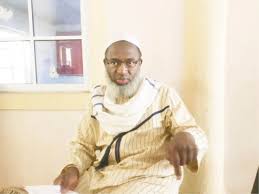
Sheikh Gumi Praises Fulani Terrorists for Kidnapping Children, Defends Atrocities as “Lesser Evil”
Abuja, Nigeria – November 6, 2025
A disturbing video has surfaced showing popular Nigerian terrorist spokesperson, Sheikh Ahmad Abubakar Gumi, openly praising Fulani terrorists for adopting child kidnapping as a means of survival.
In an interview with the BBC, Sheikh Gumi, long accused by Nigerians of serving as the chief defender and apologist for various Fulani terrorist groups, described the abduction of school children as “a lesser evil” compared to what he called “town ransacking.”
“Yes, in fact, kidnapping children from school is less evil than going into a town and ransacking it,” Gumi said during the interview.
The cleric, who has repeatedly argued that the deadly Fulani terrorists deserve sympathy and dialogue rather than military action, went further to justify the abduction of school children, saying it has “reduced the number of deaths.”
“Before, we were getting deaths by hundreds; they were going into towns, killing anybody, including children. But now they are taking children ‘safely’ without killing them. So I think we are almost reaching the climax of the negotiation. This is what we hope and aspire for,” he said.
Gumi’s comments, which have triggered widespread outrage across Nigeria, amount to a chilling defense of terrorism and the systematic targeting of Christian communities, especially Christian children across the North.
Analysts note that his statements normalize terror and attempt to rationalize what international observers, including the U.S. Commission on International Religious Freedom, have called a slow-motion genocide against Nigerian Christians.
The cleric has consistently warned the Nigerian military against taking decisive action against the Fulani jihadists, arguing that any offensive will provoke “worse massacres.” His preferred solution, community negotiations, often means villagers must pay taxes to terrorists, surrender their land, and agree never to defend themselves during future attacks.
In June 2025, Sheikh Gumi was expelled from Saudi Arabia upon arrival for the Hajj pilgrimage and barred from entry after being identified as a security threat by Saudi authorities. The incident, widely reported in Middle Eastern and Nigerian media, underscores growing international recognition of Gumi’s radical associations and extremist views.
Earlier this week, Gumi demanded that former U.S. President Donald J. Trump abandon plans to annihilate the Fulani terrorist groups, describing them as “reasonable people” who only need understanding.
Trump had recently declared his intention to take direct action against the jihadist networks responsible for massacring tens of thousands of Nigerian Christians and displacing over nine million people into internally displaced persons’ (IDP) camps.
Gumi immediately launched a barrage of attacks on Trump, accusing him of “interfering” in what he called Nigeria’s internal affairs.
Observers have since warned that Gumi’s rhetoric represents not just moral collapse but active collaboration with terrorist elements whose operations have devastated much of Northern Nigeria.
Security experts argue that the freedom with which Gumi operates, despite years of openly advocating for terrorists, reflects the deep complicity between Nigeria’s political elite and jihadist networks.
His interviews, travels, and unchallenged public advocacy, even after international censure, serve as a chilling reminder that in today’s Nigeria, terror has defenders in high places, and those defending the victims are the ones being silenced.